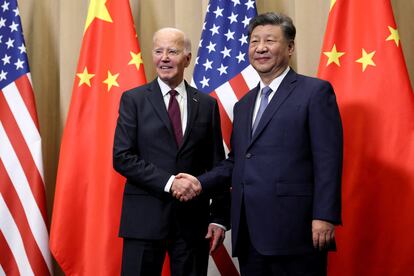Biden seeks to preserve his foreign policy legacy before Trump takes office
The outgoing U.S. president is leveraging international forums like the G20 in a bid to safeguard aid to Ukraine and reinforce the network of alliances he has fostered throughout his government


Two months before the anticipated upheaval of Donald Trump’s second term begins with his inauguration on January 20, Joe Biden and his administration are making concerted efforts to safeguard their foreign policy achievements. Biden aims to leave behind a legacy in which the U.S. is a leading global power, a defender of the multilateral order, and the cornerstone of an extensive network of international alliances — an approach embodied by his steadfast support, alongside Europe and NATO, for Ukraine in the face of the Russian invasion. On Sunday, Biden authorized Kyiv to use U.S.-supplied long-range weapons to strike deeper into Russian territory, according to reports from U.S. media, marking a significant shift in U.S. policy.
The Republican’s victory on November 5 signals a dramatic change in direction. “We have to admit that Trump’s isolationist vision is the worldview that Americans want for trade, for security, for social issues, for what America stands for,” says Ian Bremmer, founder of the Eurasia Group consultancy group. The United States’ international allies “can no longer rely on that component of American leadership that emerged from shared Western values.”
Biden is an outgoing president — a “lame duck,” as the term goes in American political circles, or perhaps more aptly, a “super-lame duck,” as Erin Murphy from the Center for Strategic and International Studies (CSIS) puts it. “His successor will implement policies vastly different from his own, and there’s nothing he can do to prevent those changes within the next couple of months.”
This reality is well understood by other world leaders: among the first to congratulate Trump were some of Biden’s key allies, such as French President Emmanuel Macron, known for his strong support of multilateralism, and Ukrainian President Volodymyr Zelenskiy. Meanwhile, there are doubts about what will happen in Germany, another pillar of the Western alliance, where the governing coalition has collapsed.
But until January 20, Biden remains in the Oval Office. And he is intensifying his diplomatic efforts and strategic moves to protect this network of economic and security alliances as much as possible. Biden is determined to ensure that Trump, who views international partnerships primarily through an economic lens, does not dismantle these alliances to address geopolitical challenges. Last December, Congress passed legislation tightening the terms for withdrawal from NATO, countering Trump’s previous attempts to do so during the latter part of his first term. Over the weekend, Biden also established a secretariat with the leaders of South Korea and Japan to solidify the trilateral alliance he achieved during his presidency.
The ongoing Russian offensive in Ukraine is another pressing concern for the outgoing administration. Last week, Secretary of State Antony Blinken traveled to Brussels to consult with allies about the current state of the war, now in a grueling, nearly three-year stalemate despite over $200 billion in aid from Kyiv’s partners. During a meeting at the White House on Wednesday, Biden emphasized to Trump the importance of continued support for Ukraine as a critical American interest.
“We believe that the United States of America, through this transition and beyond, can put Ukraine in the strongest possible position on the battlefield so that it’s in the strongest possible position at the negotiating table for an ultimate deal,” said National Security Advisor Jake Sullivan last week. This is the reason behind Biden’s recent decision to approve the use of long-range U.S. missiles for strikes within Russian territory — a longstanding request from Zelenskiy that had previously been denied due to fears of severe Russian retaliation.
With no certainty that a Republican administration will continue aid to Kyiv — indeed, indications suggest the opposite — the Democratic administration has confirmed plans to allocate the remaining $6 billion of the nearly $64 billion approved this year to maximize support for Ukraine. Washington has already notified its European allies that, come January, they will bear primary responsibility for providing for Ukraine’s needs as it continues to defend itself against Russian aggression.
New attempt at a ceasefire in Gaza
According to Sullivan, Biden “believes that America’s allies are vital to America’s national security. They make us stronger. They multiply our capability. They take a burden off of our shoulders. They contribute to our common causes.”
However, some of these diplomatic efforts have underscored the limitations of the president’s position. Last week, Biden met at the White House with Israeli President Isaac Herzog in an attempt to maintain pressure for a ceasefire in Gaza that could end the war and enable a hostage exchange. This goal — that has not been achieved after more than a year of war — faces resistance from an emboldened Israeli Prime Minister, Benjamin Netanyahu, who has restructured his government to make it even tougher, and is encouraged by Trump’s early foreign policy appointments: pro-Israel Senator Marco Rubio as Secretary of State and Mike Huckabee, who uses the Jewish biblical terms Judea and Samaria to refer to what the rest of the world knows as the West Bank, as U.S. ambassador to Israel.

Last week, Blinken repeated the same pattern that has characterized the American position throughout the war: pressuring Israel with unfulfilled threats. After issuing a 30-day ultimatum for Israel to increase humanitarian aid to Gaza, with a warning that failure to do so would result in a suspension of U.S. military assistance, the deadline passed, with Israel making no move. Yet, the State Department concluded that Israel was not obstructing aid, and the threat was quietly withdrawn.
“Even if Biden were to impose this arms ban, the Israelis believe that as soon as Trump comes in, he would immediately lift it, so it would have no effect,” explains the former U.S. ambassador to Yemen, Gerald M. Feierstein, in a video conference organized by the Middle East Institute in Washington.
This past weekend, Biden’s attention shifted eastward, during the Asia-Pacific Economic Cooperation Forum in Peru and the G20 summit in Brazil, where he addressed future economic cooperation agreements in Asia, including the Indo-Pacific Economic Framework (IPEF), which Trump has said he plans to exit.
In Lima, Biden met with Chinese President Xi Jinping to stabilize U.S.-China relations, the most significant and complex bilateral relationship in the world, involving $758 billion in annual trade. Trump — who began a trade war with China in 2018 — plans to increase U.S. tariffs on Chinese products to 60% during his second term.
Biden used the meeting on Saturday to press China over the aid it provides to the Russian war effort, in the form of supplying components, and to urge Beijing to intervene against North Korea, which has reportedly sent approximately 10,000 soldiers to Russia for combat. The White House warned that such developments could have destabilizing effects on Europe and the Indo-Pacific. Xi, in turn, cautioned that “The Taiwan question, democracy and human rights, China’s path and system, and China’s development right are four red lines for China. They must not be challenged,” as reported by Xinhua, China’s official news agency.
Biden also made history as the first U.S. president to visit the Amazon, a move aimed at highlighting his commitment to climate change action, amid concerns that Trump may withdraw the U.S. from international climate agreements.
Yet, the visit also highlighted the waning influence of his administration. While Biden aimed to reinforce ties with allies in the Asia-Pacific and Latin America, his trip was overshadowed by Xi Jinping’s longer and more impactful visit, which underscored China’s rising clout in the region. Xi inaugurated a major port in the Peruvian town of Chancay, a move that, according to Ryan Berg, director for the Americas at CSIS, “overshadowed anything Biden could say about strengthening ties with Latin America or Asia.”
In Brazil, authorities invited Biden to extend his stay for a state visit after the G20 summit, but he opted to return to Washington. Xi, however, will pay Brazil a state visit on November 20.
Sign up for our weekly newsletter to get more English-language news coverage from EL PAÍS USA Edition
Tu suscripción se está usando en otro dispositivo
¿Quieres añadir otro usuario a tu suscripción?
Si continúas leyendo en este dispositivo, no se podrá leer en el otro.
FlechaTu suscripción se está usando en otro dispositivo y solo puedes acceder a EL PAÍS desde un dispositivo a la vez.
Si quieres compartir tu cuenta, cambia tu suscripción a la modalidad Premium, así podrás añadir otro usuario. Cada uno accederá con su propia cuenta de email, lo que os permitirá personalizar vuestra experiencia en EL PAÍS.
¿Tienes una suscripción de empresa? Accede aquí para contratar más cuentas.
En el caso de no saber quién está usando tu cuenta, te recomendamos cambiar tu contraseña aquí.
Si decides continuar compartiendo tu cuenta, este mensaje se mostrará en tu dispositivo y en el de la otra persona que está usando tu cuenta de forma indefinida, afectando a tu experiencia de lectura. Puedes consultar aquí los términos y condiciones de la suscripción digital.








































